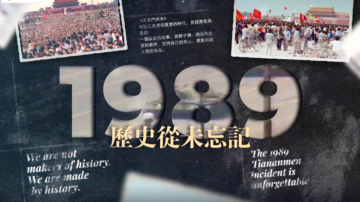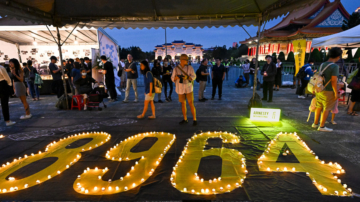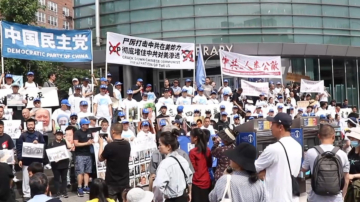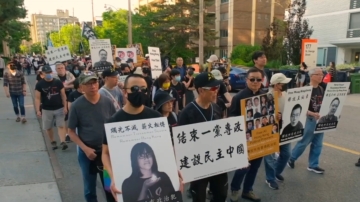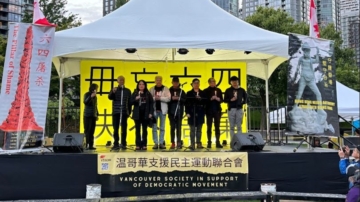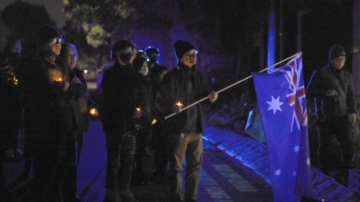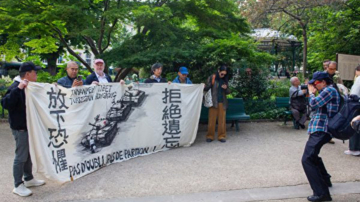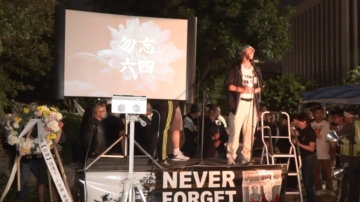【新唐人2014年02月10日訊】今年是「六四」25週年,中共官方出版社日前出版了《央視》前主播薛飛的自傳----《我在匈牙利的日子》。薛飛在書中記述了他在「六四」中的遭遇,以及被迫出國後的個人經歷。無獨有偶,中共最近還放開了因「六四」遭難的前總書記趙紫陽的部分訊息。這是中共有意為「六四」鬆綁的徵兆嗎?請看報導。
薛飛的自傳是由中共中央級專業出版機構《測繪出版社》出版,上個月中旬開始發售。
當年發生「六四事件」後,薛飛與黃金搭檔杜憲因為「黑衣出鏡」,被迫轉行當編輯。當局還對薛飛約法四條:不許配音、不許出圖像、不許外出採訪、和當編輯不能署原名等。他計劃隨隊去新疆拍攝風景片,也被新疆當局拒絕,因為怕他從邊境「潛逃」。
深受刺痛的薛飛,在1992年遠赴匈牙利定居。
薛飛在這部20萬言的自傳中,描述了他從「原本沒想離去」、到「似乎應該離去」、再到「此刻必須離去」的過程,以及他在匈牙利的奮鬥史。
而出版社稱讚這本書「是廣大青年讀者砥礪意志,陶冶情操的勵志佳作」,「具有很珍貴的閱讀收藏價值」。
北京維權人士胡佳表示,薛飛雖受眾人矚目,但他本身在「六四」中所受的迫害卻非常普遍。
北京維權人士胡佳 「真實的六四,我認為必須要談及對於天安門屠殺,對於那場血腥的用坦克、用開花彈、用中越戰場上前線下來的軍隊,來屠戮市民及學生們這樣一個事件。」
中共官方出版社出版薛飛自傳,胡佳懷疑,這是中共當局釋放煙幕來瓦解民間的意志、給自己爭取時間和空間的做法。
胡佳認為,如果中共真正想解決「六四」問題,就應該首先解禁與「六四」有關的政治犯,把「六四」的罪魁禍首找出來,但當局並沒有這樣做。
而目前中共多家門戶網站,悄悄解禁前中共總書記趙紫陽部分訊息,包括他的夫人逝世新聞、和紀念趙紫陽逝世九週年短片,以及趙紫陽新聞實錄,包括他任內作報告和出訪等畫面。
另外,民間高調到趙紫陽出生地河南省滑縣,公祭趙紫陽,當局雖派出便衣監視公祭活動,並沒有加以干擾。
旅美中國社會問題研究人士張健: 「任何對中共的幻想都是不正確的。因為在六四的屠殺過程中,中共犯下了太多的罪行,包括反人類罪。它向自己的國民、向自己的學生、手無寸鐵的百姓去開槍、去用坦克碾過那些熱血青年的身軀的時候,中共已經被宣判,已經被釘在歷史的恥辱柱上。」
現居美國的中國社會問題研究人士張健指出,中共獨裁政權向來是說一套做一套,當前中共想用民主鬆動的做法來欺騙民眾,已經騙不了人了。
不久前,趙紫陽祕書鮑彤被中共當局警告,在「六四」前,不得接受媒體採訪和發表文章﹔而「天安門母親」成員之一的張先玲,依然被當局監控。
張健: 「如果中共真正能放下它過去的罪行,還政於民,讓人民自由的站出來去發聲,不應該是現在這樣一個局面。因為在中共這個體制,每個人都綁在一個邪惡的戰車上的時候,中共是無法來自我去贖罪的。」
當年,中共鎮壓「六四」的當事人,紛紛出書想撇清與「六四」的關係。
前總理李鵬,早年打算出版日記,講述自己在六四「關鍵時刻」的所作所為,但被當局否決,後來,有關李鵬六四日記被海外出版,在市面上流傳。而在「六四」當時擔任北京市長的陳希同,去年也在香港出版自傳,公開將「六四屠城」責任推給了鄧小平。
採訪/常春 編輯/宋風 後製/蕭宇
CCP Publishes Xue Fei Biography: Is Ban Lifting on June 4 Incident?
This year will mark the 25th anniversary of the
June 4, or Tiananmen Square massacre, incident.
The Chinese Communist Party (CCP) has recently published
a biography of Xue Fei, a former CCTV news announcer.
The book, entitled “My Days in Hungary”, tells
of Xue Fei’s personal experience during June 4.
It describes how he was forced to move abroad afterwards.
In addition, the party has also partially lifted a ban on
information about former general secretary Zhao Ziyang.
Are these acts signaling a thawing of the regimes
perceptions towards June 4? Let’s take a look.
Xue Fei’s biography was published by
the Surveying and Mapping Press.
This is a central-level publishing organ of the
party. The book was released in mid-January.
During the unfolding of the June 4 in 1989,
Xue Fei and his partner Du Xian had announced
the news on CCTV while dressed in black.
Because of this act, he was moved to work as an editor.
The party also forbade him to do dubbing,
to appear on camera, to perform non-local
interviews and to sign his name on reports.
When he planned to join a team in filming landscapes
in Xinjiang, the provincial authority denied his request.
This was on the grounds of preventing
him from “escaping China across the border”.
Deeply effected by these experiences,
Xue Fei decided to move to Hungary in 1992.
In his 200,000-word biography, Xue described how
his mind changed from “never consider leaving China.”
It moved towards “maybe I should leave”,
and eventually, “I have to leave now”.
The book also includes his story
of continuing struggles in Hungary.
The publisher said Xue’s biography “is an inspirational
work, to help young readers build their character.”
It “is of great value for reading and collecting.”
Beijing human rights activist Hu Jia suggests that although
Xue Fei was a public figure, drawing much attention during
June 4, his persecution was only relatively moderate.
Hu Jia, Beijing Human Rights Activist: “I think
the Tiananmen Square Massacre has to be
mentioned when talking about the truth of June 4.
It was a bloody slaughter of civilians
and students by the party’s army.
They used tanks and shrapnel shells that
had come back from the Sino-Vietnamese War.”
Why has the CCP published Xue Fei’s biography officially?
Hu Jia worries that this was a move to cover-up the incident.
It attempted to ease advocates who seek justice for
victims of the incident, and buy the party more time.
Hu Jia comments that if the CCP really wanted
to solve the issue, the first thing to do was to lift
bans on all political prisoners involved in June 4.
It would seek out the culprits responsible for the
massacre, but the CCP regime is yet to do that.
Recently, several party portal websites discreetly unblocked
information about former general secretary Zhao Ziyang,
This included reports of the death of Zhao’s wife
Liang Boqi’s, and a short memorial film marking
the 9th anniversary of Zhao’s death.
It also included a news chronicle of Zhao, and footage
of Zhao’s lectures and visits to foreign countries.
In addition, Chinese people organized a high-profile
memorial ceremony in Hua County, Henan Province.
This is Zhao’s birthplace. The CCP dispatched plainclothes
officers to observe the event, but they did not interfere.
Zhang Jian, China affair expert: “There
should be no illusion of hope for the CCP.
With the Tiananmen Massacre, the CCP committed
numerous crimes, especially crimes against humanity.
It shot its own citizens, students
and unarmed ordinary people.
Its tank ran over those youngsters’ flesh and blood. With
this act, the party has been conclusively stained with blood.”
Zhang Jian further commented that the CCP
regime always acts differently from what it says.
Now it is no longer able to deceive Chinese people by
releasing some signals of superficial democratization.
Bao Tong, Zhao Ziyang’s former secretary, was recently
warned by the party that he should not agree to any
interviews, or publish any articles in the lead up to June 4.
Zhang Xianling, a member of Tiananmen Mothers,
remains under surveillance by the authorities.
Zhang Jian: “If the CCP can really announce its
previous crimes, and return power to the Chinese
people, giving them freedom of speech, make them
voice freely, China will be a very different place.
The key is that the CCP has attached
all its followers to an evil war machine.
Therefore, is not able to redeem itself because of it’s sins.
Former party leaders involved in June 4 have
attempted to defend themselves by writing books.
Former CCP’s premier Li Peng, had
planned to publish his personal diary.
The diary told his story during critical moments of June 4.
This plan to publish was stopped by the CCP authorities.
However, the diary was later released by
foreign publishers and still came to market.
Chen Xitong, who was the Mayor of Beijing during the
incident, also published biography in Hong Kong last year.
This book publicly blamed the
massacre on Deng Xiaopeng.
Interview/ChangChun Edit/SongFeng Post-Production/Xiaoyu
薛飛的自傳是由中共中央級專業出版機構《測繪出版社》出版,上個月中旬開始發售。
當年發生「六四事件」後,薛飛與黃金搭檔杜憲因為「黑衣出鏡」,被迫轉行當編輯。當局還對薛飛約法四條:不許配音、不許出圖像、不許外出採訪、和當編輯不能署原名等。他計劃隨隊去新疆拍攝風景片,也被新疆當局拒絕,因為怕他從邊境「潛逃」。
深受刺痛的薛飛,在1992年遠赴匈牙利定居。
薛飛在這部20萬言的自傳中,描述了他從「原本沒想離去」、到「似乎應該離去」、再到「此刻必須離去」的過程,以及他在匈牙利的奮鬥史。
而出版社稱讚這本書「是廣大青年讀者砥礪意志,陶冶情操的勵志佳作」,「具有很珍貴的閱讀收藏價值」。
北京維權人士胡佳表示,薛飛雖受眾人矚目,但他本身在「六四」中所受的迫害卻非常普遍。
北京維權人士胡佳 「真實的六四,我認為必須要談及對於天安門屠殺,對於那場血腥的用坦克、用開花彈、用中越戰場上前線下來的軍隊,來屠戮市民及學生們這樣一個事件。」
中共官方出版社出版薛飛自傳,胡佳懷疑,這是中共當局釋放煙幕來瓦解民間的意志、給自己爭取時間和空間的做法。
胡佳認為,如果中共真正想解決「六四」問題,就應該首先解禁與「六四」有關的政治犯,把「六四」的罪魁禍首找出來,但當局並沒有這樣做。
而目前中共多家門戶網站,悄悄解禁前中共總書記趙紫陽部分訊息,包括他的夫人逝世新聞、和紀念趙紫陽逝世九週年短片,以及趙紫陽新聞實錄,包括他任內作報告和出訪等畫面。
另外,民間高調到趙紫陽出生地河南省滑縣,公祭趙紫陽,當局雖派出便衣監視公祭活動,並沒有加以干擾。
旅美中國社會問題研究人士張健: 「任何對中共的幻想都是不正確的。因為在六四的屠殺過程中,中共犯下了太多的罪行,包括反人類罪。它向自己的國民、向自己的學生、手無寸鐵的百姓去開槍、去用坦克碾過那些熱血青年的身軀的時候,中共已經被宣判,已經被釘在歷史的恥辱柱上。」
現居美國的中國社會問題研究人士張健指出,中共獨裁政權向來是說一套做一套,當前中共想用民主鬆動的做法來欺騙民眾,已經騙不了人了。
不久前,趙紫陽祕書鮑彤被中共當局警告,在「六四」前,不得接受媒體採訪和發表文章﹔而「天安門母親」成員之一的張先玲,依然被當局監控。
張健: 「如果中共真正能放下它過去的罪行,還政於民,讓人民自由的站出來去發聲,不應該是現在這樣一個局面。因為在中共這個體制,每個人都綁在一個邪惡的戰車上的時候,中共是無法來自我去贖罪的。」
當年,中共鎮壓「六四」的當事人,紛紛出書想撇清與「六四」的關係。
前總理李鵬,早年打算出版日記,講述自己在六四「關鍵時刻」的所作所為,但被當局否決,後來,有關李鵬六四日記被海外出版,在市面上流傳。而在「六四」當時擔任北京市長的陳希同,去年也在香港出版自傳,公開將「六四屠城」責任推給了鄧小平。
採訪/常春 編輯/宋風 後製/蕭宇
CCP Publishes Xue Fei Biography: Is Ban Lifting on June 4 Incident?
This year will mark the 25th anniversary of the
June 4, or Tiananmen Square massacre, incident.
The Chinese Communist Party (CCP) has recently published
a biography of Xue Fei, a former CCTV news announcer.
The book, entitled “My Days in Hungary”, tells
of Xue Fei’s personal experience during June 4.
It describes how he was forced to move abroad afterwards.
In addition, the party has also partially lifted a ban on
information about former general secretary Zhao Ziyang.
Are these acts signaling a thawing of the regimes
perceptions towards June 4? Let’s take a look.
Xue Fei’s biography was published by
the Surveying and Mapping Press.
This is a central-level publishing organ of the
party. The book was released in mid-January.
During the unfolding of the June 4 in 1989,
Xue Fei and his partner Du Xian had announced
the news on CCTV while dressed in black.
Because of this act, he was moved to work as an editor.
The party also forbade him to do dubbing,
to appear on camera, to perform non-local
interviews and to sign his name on reports.
When he planned to join a team in filming landscapes
in Xinjiang, the provincial authority denied his request.
This was on the grounds of preventing
him from “escaping China across the border”.
Deeply effected by these experiences,
Xue Fei decided to move to Hungary in 1992.
In his 200,000-word biography, Xue described how
his mind changed from “never consider leaving China.”
It moved towards “maybe I should leave”,
and eventually, “I have to leave now”.
The book also includes his story
of continuing struggles in Hungary.
The publisher said Xue’s biography “is an inspirational
work, to help young readers build their character.”
It “is of great value for reading and collecting.”
Beijing human rights activist Hu Jia suggests that although
Xue Fei was a public figure, drawing much attention during
June 4, his persecution was only relatively moderate.
Hu Jia, Beijing Human Rights Activist: “I think
the Tiananmen Square Massacre has to be
mentioned when talking about the truth of June 4.
It was a bloody slaughter of civilians
and students by the party’s army.
They used tanks and shrapnel shells that
had come back from the Sino-Vietnamese War.”
Why has the CCP published Xue Fei’s biography officially?
Hu Jia worries that this was a move to cover-up the incident.
It attempted to ease advocates who seek justice for
victims of the incident, and buy the party more time.
Hu Jia comments that if the CCP really wanted
to solve the issue, the first thing to do was to lift
bans on all political prisoners involved in June 4.
It would seek out the culprits responsible for the
massacre, but the CCP regime is yet to do that.
Recently, several party portal websites discreetly unblocked
information about former general secretary Zhao Ziyang,
This included reports of the death of Zhao’s wife
Liang Boqi’s, and a short memorial film marking
the 9th anniversary of Zhao’s death.
It also included a news chronicle of Zhao, and footage
of Zhao’s lectures and visits to foreign countries.
In addition, Chinese people organized a high-profile
memorial ceremony in Hua County, Henan Province.
This is Zhao’s birthplace. The CCP dispatched plainclothes
officers to observe the event, but they did not interfere.
Zhang Jian, China affair expert: “There
should be no illusion of hope for the CCP.
With the Tiananmen Massacre, the CCP committed
numerous crimes, especially crimes against humanity.
It shot its own citizens, students
and unarmed ordinary people.
Its tank ran over those youngsters’ flesh and blood. With
this act, the party has been conclusively stained with blood.”
Zhang Jian further commented that the CCP
regime always acts differently from what it says.
Now it is no longer able to deceive Chinese people by
releasing some signals of superficial democratization.
Bao Tong, Zhao Ziyang’s former secretary, was recently
warned by the party that he should not agree to any
interviews, or publish any articles in the lead up to June 4.
Zhang Xianling, a member of Tiananmen Mothers,
remains under surveillance by the authorities.
Zhang Jian: “If the CCP can really announce its
previous crimes, and return power to the Chinese
people, giving them freedom of speech, make them
voice freely, China will be a very different place.
The key is that the CCP has attached
all its followers to an evil war machine.
Therefore, is not able to redeem itself because of it’s sins.
Former party leaders involved in June 4 have
attempted to defend themselves by writing books.
Former CCP’s premier Li Peng, had
planned to publish his personal diary.
The diary told his story during critical moments of June 4.
This plan to publish was stopped by the CCP authorities.
However, the diary was later released by
foreign publishers and still came to market.
Chen Xitong, who was the Mayor of Beijing during the
incident, also published biography in Hong Kong last year.
This book publicly blamed the
massacre on Deng Xiaopeng.
Interview/ChangChun Edit/SongFeng Post-Production/Xiaoyu

